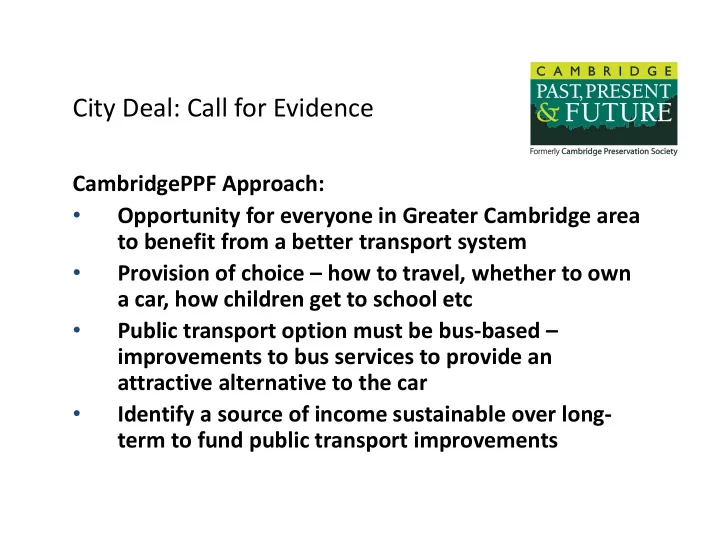

City Deal: Call for Evidence CambridgePPF Approach: • Opportunity for everyone in Greater Cambridge area to benefit from a better transport system • Provision of choice – how to travel, whether to own a car, how children get to school etc • Public transport option must be bus-based – improvements to bus services to provide an attractive alternative to the car • Identify a source of income sustainable over long- term to fund public transport improvements
City Deal: Call for Evidence • The only realistic and fair sustainable source of income is some form of fiscal demand management • If we want to improve our public transport services, a congestion charge is the only sustainable way of delivering this. • People need to be given a genuine choice – to pay or to use an improved public transport service • Congestion charge as part of comprehensive package alongside infrastructure upgrades and public transport improvements, cycling and walking.
City Deal: Call for Evidence • CambridgePPF believes need to correct the imbalance between capacity of road network and demand by drivers • Past focus on increasing capacity by infrastructure engineering, transport improvements – useful but not enough on their own • Need to address demand to change driver behaviour • More stick as well as carrot
City Deal: Call for Evidence • Demand Management: - Passive measures to ‘frustrate’ drivers out of cars: - Core Traffic Scheme, bollards, parking controls - Marginally effective in stabilising growth but drivers very resilient: need stronger measures - Direct measures to encourage behaviour change: - workplace parking charge: paid by employer so becomes employment tax: competitiveness - some form of congestion charge
City Deal: Call for Evidence How might a Congestion Charge work? • CambridgePPF more concerned with having the principle of a charge accepted that with the operational details • Appoint consultants to examine charges in other cities and model possible alternatives • To be publicly accepted, system must be Fair, Non-Discriminating, Social Equitable, and Sustainable
City Deal: Call for Evidence Fair: - provide choice – public transport or car - income ring-fenced to subsidise public transport - benefit spread across whole Greater Cambridge area not just free P&R Non-Discriminatory: - everybody pays whether resident in City or South Cambs - not just a cordon but a city-wide network of sensors
City Deal: Call for Evidence • Socially Equitable: - all bus services throughout City and South Cambs would potentially benefit - exemptions: Blue Badge holders, others to be decided - some element of differential charging with bigger cars paying more: air quality benefit • Sustainable: - sustainable long-term income for public transport from those who chose to drive - some front-end loading as attractive alternative available from day charge introduced
City Deal: Call for Evidence Experience from Cites with Congestion Charge: • Traffic volumes typically reduced by some 20-30% • Reduced volumes maintained over several years • Journey times improved proportionately but often then increase as road priority given to buses and pedestrians • Significant improvements to air quality • Public attitude typically hostile at first but supportive once quality of life benefits materialise (Milan) • Substantial income generated: 10-years London scheme, gross £2.6b with £1.6b invested in public transport
City Deal: Call for Evidence Would it work in Cambridge? • Evidence shows financial penalty effective in persuading drivers out of their cars • Needs to be part of a bigger comprehensive package of measures including infrastructure improvements • Public likely to be sceptical but experience shows quickly become accustomed and then supportive • 2009 Transport Commission, 59% conditional support • Every reason to expect a direct charge to make a significant contribution to alleviating city’s congestion
Recommend
More recommend